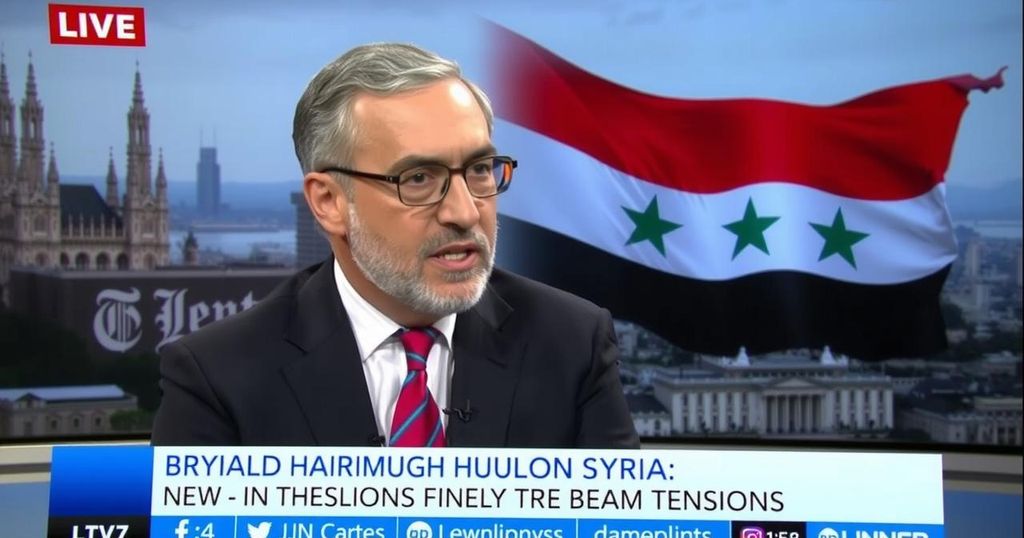Julani’s Vision: Building Stability and Governance in Post-War Syria
Ahmad al-Julani, the leader of Hayat Tahrir al-Sham, declared that Israel has no valid reasons to intervene in Syria, emphasizing the need for reconstruction and stability after the departure of Iranian forces. He criticized the Assad regime’s policies that have impoverished Syrians, advocated for the end of captagon production, and signaled a shift towards state governance and inclusivity for minority communities.
In a groundbreaking interview with opposition channel Syria.tv, Ahmad “Abu Mohammad al-Julani” al-Sharaa, the leader of Hayat Tahrir al-Sham (HTS), articulated his vision for Syria’s future. Julani asserted that Israel lacks valid justifications for any military actions in Syria, particularly following the withdrawal of Iranian forces. He emphasized the urgency for reconstruction and stability, prioritizing diplomatic efforts to uphold Syrian sovereignty and avert new conflicts that could exacerbate the dire situation in the country.
Julani condemned the Iranian regime’s role in transforming Syria into a battleground that endangered its citizens while clarifying that his concerns lie with policies rather than the Iranian people. He noted that the Syrian revolution has evolved into a need for institutional governance, requiring a shift from revolutionary fervor to a focus on stability and law.
The HTS leader highlighted the Assad regime’s mismanagement, claiming it has plunged Syria into poverty through systematic oppression and exploitation. He intends to dismantle the captagon drug trade, a byproduct of the regime’s policies, signaling a commitment to reform and national rebuilding. Furthermore, Julani pledged to protect minority communities, including Christians and Druze, affirming a vision for a united Syrian front against common threats.
In recognition of the evolving dynamics, he acknowledged the necessity of re-evaluating relationships with Russia, while condemning its military actions during the civil war. Julani pronounced that the Syrian Defense Ministry would dissolve armed factions, centralizing authority under the state to restore order and promote governance.
This unprecedented engagement from a rebel leader signals a potential paradigm shift in Syrian politics, advocating for reconstruction, inclusivity, and a balanced approach toward foreign relations.
The ongoing Syrian conflict has led to numerous external interventions and a protracted humanitarian crisis, greatly affecting the country’s stability. As various factions vie for power, leaders like Ahmad al-Julani of HTS have begun to redefine their roles from insurgency to governance, seeking to establish order and address the challenges faced by the Syrian populace. The shift in discourse surrounding foreign intervention, particularly regarding Israeli involvement and Iranian presence, provides insight into the evolving political dynamics in Syria. Julani’s remarks come at a time when the Syrian landscape is increasingly complex, with multiple interests at play, including those of Turkey, Russia, and the United States. Understanding Julani’s perspective is critical in analyzing future prospects for peace, development, and governance in Syria.
Ahmad al-Julani’s recent statements mark a significant turning point in the landscape of the Syrian conflict, reflecting a desire for reconstruction over continued conflict. By condemning both the Iranian regime and the Assad administration’s failures, he underscores the necessity for a transition towards stability and governance. His commitment to eradicating the captagon drug issue and safeguarding minority rights indicates a broader aspiration for a cohesive and prosperous Syrian state, while cautiously navigating foreign relations, especially with Russia and Israel.
Original Source: www.jpost.com




Post Comment